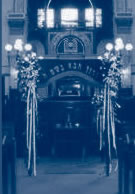|
SEDRA : SHOFTIM Hertz Chumash p. 820 Deuteronomy
Chap. 16 verse 18
This week's Sedra is looking for a sponsor.
SYNOPSIS:
Moses proceeded to review the regulations needed to ensure
the conditions necessary for a civilised society. Local judges
and officers were to be appointed in every city, and justice
was to be administered righteously and impartially. A judge
was, therefore, strictly forbidden to display bias or accept
a bribe. If a local judge were to find a case too difficult
to decide, he should refer it to a higher authority, namely
the Kohanim and the Supreme Court sitting at the Court of
the Sanctuary. Their decision would be final, and refusal
to abide by their verdict may be punishable by death.
The crime of idolatry, determined after a thorough inquiry,
was to be punished by death through stoning. The testimony
of a least two eye witnesses was required and they had to
administer a formal warning to the perpetrator. These witnesses
were to be the first to carry out the execution.
Moses noted that the time would come when it was appropriate
for the people to choose a king to rule over them, as was
the case with other nations. When this occurred, the appointed
ruler was to be a native Israelite chosen by G-d. He was not
to misuse his power to amass many horses, maintain a harem,
or accumulate great wealth. He was to write or commission
a copy of the Torah Law for his own use, it was to accompany
him at all times, so that the would be G-d fearing and Torah-observant.
After enumerating the gifts that the Kohanim were to receive
for their sustenance, Moses ruled that if a Kohen from a city
other than the one whose Kohanim were on duty came to the
Sanctuary, he would be allowed to minister together with the
Kohanim already there and to share in the dues they received.
The Torah forbids all forms of superstition and "magic"
practiced by soothsayers. Israel had no need to resort to
such tricks, for G-d would provide inspired prophets from
among the Israelites themselves. These would communicate G-d's
will to them. False prophets who spoke in the name of idols
were to be punished with death. The false seer could be distinguished
from the true one by the non-fulfilment of his predictions.
The removal of a landmark to enlarge one's own estate constitutes
theft. Before anyone could be convicted of a crime, his criminality
has to be confirmed by at least two witnesses. If a witness
was shown to have given false evidence, he was to receive
the punishment intended for his innocent victim.
The Israelites should not display any fear before engaging
in battle against a powerful enemy, for G-d would protect
them. Four categories of men were to be exempt from military
service; the man who had just built a new house but who had
not yet dedicated it; one who had planted a vineyard and had
not yet enjoyed its fruits; one who had just become betrothed;
and one who was fearful by nature.
Before Israel attacked a hostile city, she should try to
negotiate a peaceful entry, in which case the city's inhabitants
would become subservient to Israel. Only if these peace overtures
failed could war be waged. If Israel were victorious, all
men of the enemy were to be put to death, but their women
and children were to be spared. Fruit trees were not to be
destroyed during a siege, so that they could continue to benefit
the new inhabitants of the conquered city.
If the body of a murdered person were found in the field,
and the murderer could not be discovered, responsibility for
the murder rested with the city nearest the scene of the murder.
In atonement, the Judges and Elders of the city, acting on
behalf of the other inhabitants, were to slaughter a young
heifer in an uncultivated valley containing a stream. They
then were to wash their hands in the presence of Kohanim,
testifying that they were in no way responsible for the murder,
and pray for forgiveness.
HAPHTORAH HERTZ CHUMASH P 835 Isaiah Chap 51 verse 12
This is the fourth haphtorah of comfort following Tisha B'av.
It is taken from the prophecies of Isaiah and speaks of the
good tidings of peace and the redemption of Jerusalem and
the people of Israel.
TELL ME RABBI ..... "KNOW BEFORE WHOM YOU ARE STANDING"
Above the Aron Kodesh in almost every Synagogue are proclaimed
the words "Know before Whom You are Standing ?"
or "I have set the Lord always before me". (Psalm
16,8).
The opening words of the Shulchan Aruch (Code of Jewish law.
Chapter 1 precept 1) reiterate the words of the psalmist::
"I have set the Lord always before me" (Psalm 16.8)
: This is a leading principle in our faith, and in the upward
strivings of the righteous who walk ever in the presence of
G-d. For a man 's mode of life, his demeanour and his deeds,
his speech and his movements, when alone at home or in the
intimate circle of his family and friends, are unlike those
which he would exhibit when in the presence of a great king.
And how much more considered will his demeanour be, if he
reflect that there stands over him the King of kings, the
Holy One, blessed be He, whose glory fills the whole earth,
watching his conduct and surveying his deeds; even as it is
written: "Can any hide himself in secret places that
I shall not see him?" says the Lord (Jeremiah 23.24).
Such contemplation must perforce imbue him with a true sense
of reverence and humility, ..... before the Holy Name..."
The reverence, sincerity, humility and decency of our conduct
in synagogue must consistently be of the highest order;"...the
Lord always before me". Without appropriate behaviour,
our prayers ring hollow.
BACK TO SHABBAT SHALOM
TABLE
|








